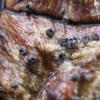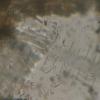
27-02-2026 17:51
 Michel Hairaud
Michel Hairaud
Bonjour, Quelqu'un peut il me donner un conseil p

27-02-2026 16:17
 Mathias Hass
Mathias Hass
Hi, Found this on Betula, rather fresh fallen twi

28-02-2026 14:43
A new refrence desired :Svanidze, T.V. (1984) Novy

01-03-2026 18:02
 Francois Guay
Francois Guay
I found this mystery Helotiales on an incubated le

01-03-2026 14:10
 Antonio Couceiro
Antonio Couceiro
Hola, me gustaria conocer opiniones sobre este tem

01-03-2026 18:46
 Robin Isaksson
Robin Isaksson
Hi! This species i se from time to time in the

01-03-2026 08:55
 Michel Hairaud
Michel Hairaud
Bonjour , Je souhaiterais recevoir cet article :�
Dark ones on Pimus cone
Marja Pennanen,
26-01-2023 15:23
Hello forum.
I collected some dark ones on Pinus cones last spring in Sodankylä, Lappland.
Now I finally studied them. They are now, when dry about 0,2-0,5 mm wide.
The spores are about 8-10x 3-4 and develop up to 3 septas.
The asci are about 40x6, IKI-.
I have absolutely no idea of, what these may be.
Hopefully someone here knows more about northern species: Marja
Hans-Otto Baral,
26-01-2023 16:51

Re : Dark ones on Pimus cone
Hallo Marja!
Should be ostropalean. You can compare Odontotrema (O. minus). I found the spores larger, 11-13 x 5-6, 3-septate, eguttulate. Also Sherwood says 10-14 x 4-4.5 when dead.
But the hymenium should show some IKI-reaction.
Asci have an apical thickening when dead and paraphyses are multiseptate, uninflated, and a little granular around the tips.
Zotto
Marja Pennanen,
26-01-2023 17:27
Re : Dark ones on Pimus cone
Thank you Zotto!
I just took a fast look at the fungus, so the measurements are few and not very accurate. I do not like dry specimen, they are not easy to handle. But could not take a microscope with me, when I went to Lapland.
This looks like, what I quickly found from Odontotrema.
Greetings to your family, too: Marja
Hans-Otto Baral,
26-01-2023 17:40

Re : Dark ones on Pimus cone
If not too old it can be that the fungus is still alive. Ostropales are generally drought-tolerant. Rehydrate and it is like fresh.

